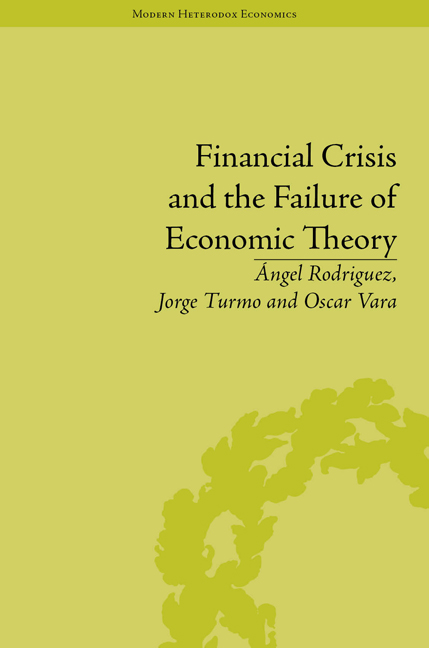Book contents
- Frontmatter
- Contents
- Acknowledgements
- List of Figures
- Introduction
- 1 The Financial Crisis and Modern Economics: From Surprise to Puzzlement
- 2 A Different Look at Economic Theory: The Anthropological Approach
- 3 The ‘Building Blocks’ of Modern Economics: We Do Really Need a Meta-Theory
- 4 The Meta-Theory at Work: A Case Study in Growth Theory and Real Business Cycle Theory
- 5 Governments and the Financial Crisis: Making Economic Policy in the Dark
- 6 Explaining More Complex Phenomena: The Financial System
- Final Remarks
- Notes
- Works Cited
- Index
6 - Explaining More Complex Phenomena: The Financial System
- Frontmatter
- Contents
- Acknowledgements
- List of Figures
- Introduction
- 1 The Financial Crisis and Modern Economics: From Surprise to Puzzlement
- 2 A Different Look at Economic Theory: The Anthropological Approach
- 3 The ‘Building Blocks’ of Modern Economics: We Do Really Need a Meta-Theory
- 4 The Meta-Theory at Work: A Case Study in Growth Theory and Real Business Cycle Theory
- 5 Governments and the Financial Crisis: Making Economic Policy in the Dark
- 6 Explaining More Complex Phenomena: The Financial System
- Final Remarks
- Notes
- Works Cited
- Index
Summary
The Evolution of the Financial System: Quantitative and Qualitative Issues
In the previous chapters we have moved from a broad sketch of the developments of the 2008 global economic and financial crisis to the policymaking responses to that challenge. But we have done so through its theoretical scaffolding, starting with the anthropological structure of the competing economic schools of thought, passing through the common logical structure of economic theories, and the framework of modern contemporary mainstream macroeconomic modelling. Rather than making a case against both conventional and unconventional economic wisdom, we have been looking for solutions by broadening the scope of the regular praxis. Most of these reflections could have been made with no reference at all to the 2008 developments. Nevertheless, the social costs assumed by people almost everywhere in the world, forces a serious self-examination about the reliability of our present-day macroeconomic research. From the very beginning, our view has been critical but quite inclusive as well. Rather than eschewing all previous work as useless, we take it as a valuable starting point. As we saw in Chapter 3, the logical structure of economic theory, the meta-theory, can provide us with a general framework for improving our modelling as well as a benchmark to test the successes and failures of a specific research programme. The analysis of RBC theory carried out in Chapter 4 shows that its theoretical structure did not allow a proper understating of the financial processes that brought about the crisis.
- Type
- Chapter
- Information
- Financial Crisis and the Failure of Economic Theory , pp. 125 - 166Publisher: Pickering & ChattoFirst published in: 2014



